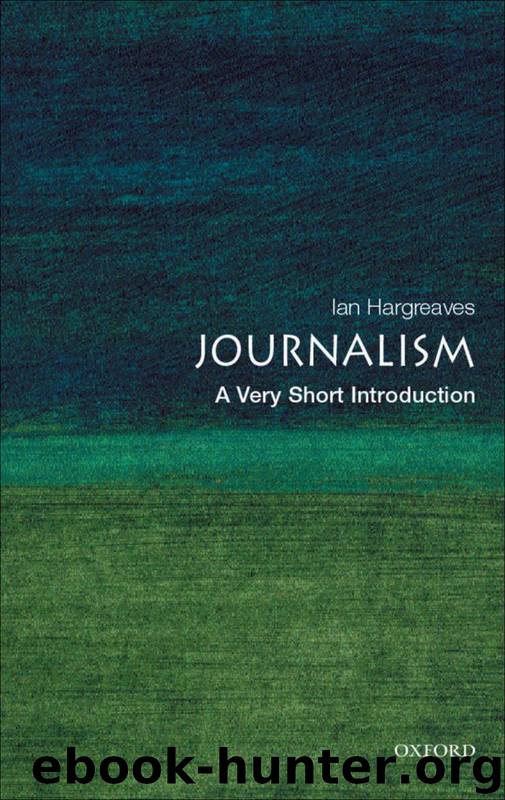Journalism by Hargreaves Ian;

Author:Hargreaves, Ian;
Language: eng
Format: epub
Publisher: Oxford University Press, UK
Published: 2005-03-13T05:00:00+00:00
15. William Randolph Hearst was the ultimate press baron, mixing politics, celebrity high life, and newspapering in a potent blend. Orson Welles based his film Citizen Kane on Hearst’s life, but there is doubt about whether Hearst ever sent the famous message to one of his illustrators, telling him to stay in Cuba to cover a war that Hearst said he would ensure took place.
All industrialized countries had their Lord Coppers. In France, the textile manufacturer Jean Prouvost built a press empire which included the daily Le Figaro, Paris-Soir, and two of the twentieth century’s most successful magazines, Marie-Claire for women and the illustrated weekly news magazine Paris-Match. In Germany, Spain, and Italy, matters were complicated by the rise and fall of fascism. Germany’s biggest media group today, Bertelsmann, has its roots in religious book publishing, but the country’s dominant newspaper owner, Axel Springer, fits the Citizen Kane bill, even though his firm only began operations in Hamburg in 1946, under licence from the occupying British forces. Springer launched the populist Bild-Zeitung in 1952 and by the mid-1960s controlled 40 per cent of the West German press. Like Hearst, Springer is famed for a single pronouncement – that too much reflection is bad for Germans – and is also immortalized in a work of fiction, Heinrich Böll’s The Lost Honour of Katharina Blum.
But gradually, the corporate types have overhauled the tycoons. Today, even the American supermarket tabloids, once the personal instrument of owner-publishers like Generoso Pope, are mostly small units in larger publishing groups, enjoying advantages of scale in back-office functions; cross-selling between different advertising markets and wielding greater weight in negotiations for publishing rights to celebrity content and sports rights.
It is a matter of heated debate which of these models best serves journalism. In the heyday of press barons, journalists had a great deal to say about their bosses’ excesses, prejudices, vanity, and occasional brutality. Today, many journalists are critical of the power wielded by a Silvio Berlusconi or a Rupert Murdoch, who stand as exceptions to the decline of the media tycoon. Journalists, however, are not much enamoured of the press barons’ ‘corporate man’ successors.
Download
This site does not store any files on its server. We only index and link to content provided by other sites. Please contact the content providers to delete copyright contents if any and email us, we'll remove relevant links or contents immediately.
Asking the Right Questions: A Guide to Critical Thinking by M. Neil Browne & Stuart M. Keeley(5775)
Autoboyography by Christina Lauren(5235)
Eat That Frog! by Brian Tracy(4540)
Dialogue by Robert McKee(4405)
Sticky Fingers by Joe Hagan(4199)
Journeys Out of the Body by Robert Monroe(3624)
Annapurna by Maurice Herzog(3468)
Full Circle by Michael Palin(3450)
Schaum's Quick Guide to Writing Great Short Stories by Margaret Lucke(3381)
Elements of Style 2017 by Richard De A'Morelli(3350)
The Art of Dramatic Writing: Its Basis in the Creative Interpretation of Human Motives by Egri Lajos(3068)
Atlas Obscura by Joshua Foer(2962)
Why I Write by George Orwell(2955)
The Fight by Norman Mailer(2942)
The Diviners by Libba Bray(2938)
In Patagonia by Bruce Chatwin(2932)
The Mental Game of Writing: How to Overcome Obstacles, Stay Creative and Productive, and Free Your Mind for Success by James Scott Bell(2909)
Venice by Jan Morris(2574)
The Elements of Style by William Strunk and E. B. White(2473)
